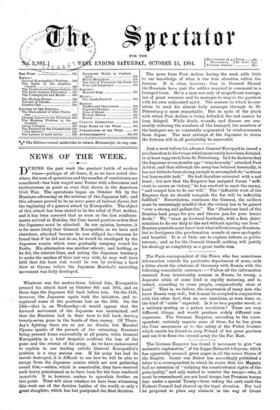Just a week before his advance General Kuropatkin issued a
proclamation to his troops which must surely have been dictated, or at least suggested, from St. Petersburg. In it he declares that the Japanese seven months ago "treacherously" attacked Port Arthur, and that although the army has behaved heroically, it has not hitherto been strong enough to accomplish its "arduous but honourable task." He had therefore retreated with a sad heart ; but now that the Emperor has assigned forces "suffi- cient to assure us victory," he has resolved to meet the enemy, "and compel him to do our will." The "inflexible wish of the Emperor that we should vanquish the foe will be inflexibly fulfilled." Nevertheless, continues the General, the soldiers must be unceasingly mindful that the victory has to be gained "over a strong and gallant foe." The "illustrious head of the Russian land prays for you and blesses you for your heroic deeds." We "must go forward fearlessly, with a firm deter- mination to do our duty to the end without sparing our lives." Russian generals must know best what will encourage Russians, but to foreigners this proclamation sounds at once apologetic and boastful. It is of little use to explain defeats as politic retreats ; and as for the General himself, nothing will justify his strategy so completely as a great battle won.










































